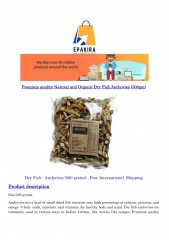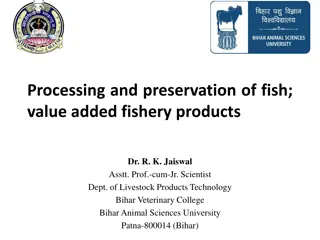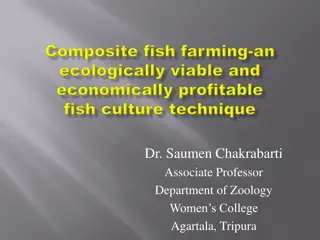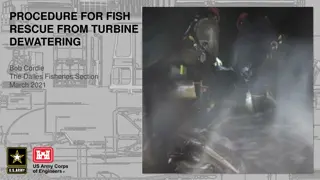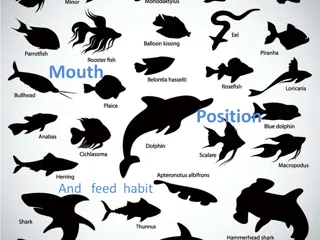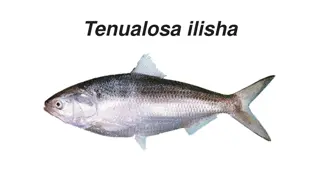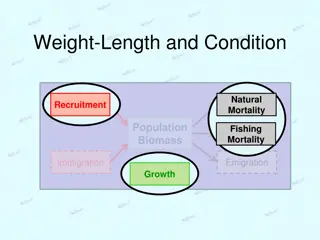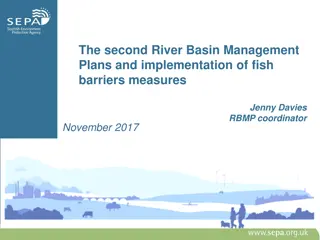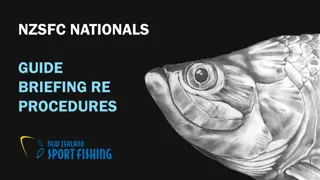Surviving the Wild: A Fish's Journey Full of Challenges
Enter the wild as a fish, facing various obstacles such as parasites, predators, and human interference. Roll the dice and navigate through different scenarios where your fate hangs on the outcome. Learn interesting fish facts along the way as you strive to survive for a full year in the unpredictable waters.
Download Presentation

Please find below an Image/Link to download the presentation.
The content on the website is provided AS IS for your information and personal use only. It may not be sold, licensed, or shared on other websites without obtaining consent from the author.If you encounter any issues during the download, it is possible that the publisher has removed the file from their server.
You are allowed to download the files provided on this website for personal or commercial use, subject to the condition that they are used lawfully. All files are the property of their respective owners.
The content on the website is provided AS IS for your information and personal use only. It may not be sold, licensed, or shared on other websites without obtaining consent from the author.
E N D
Presentation Transcript
Fish face many challenges everyday. Will you be able to survive a full year as a fish in the wild? Roll the dice, and move ahead to start your journey.
You are infected with a parasite. You die and your game is over. Fact: Did you know that a parasite lives in or on an animal, and causes harm to that animal? Not all parasites cause death, and they are often a natural part of ecosystems.
Wow! What a great bug hatch. You eat until your stomach is full. Roll the dice and move ahead.
Swim quickly! An otter is hunting for food, and you are on the menu. You speed up and get away before the otter sees you. Move ahead 1 spot.
Uh Oh. A tourist caught you and kept you out of the water too long for photos. You feel awful, and are on the verge of dying. Hold your breath as long as you can. Roll the dice, and drag yourself backwards that many spots. Fact: Did you know that fish can be severely injured just from being out of the water for too long? They may look fine, but have damage to their gills.
An osprey has spotted you, caught you, and fed you to its hungry chicks. Flop twice. Your game is over. Fact: Did you know that live fish make up about 99% of an osprey s diet? Osprey are often called fish hawks for this reason.
What happened? You got a shock of electricity and went stiff. A biologist captured you, took measurements, then released you back into the water. Count your fins (or fingers) to make sure you haven t been harmed. Roll the dice and move ahead that many spots. Fact: Scientists often use electroshocking as a technique to collect fish.
Someone has improved your habitat in a stretch of the river. It feels great! Take a look around and enjoy the view. Roll the dice and move ahead. Fact: Did you know that not all fish use the same type of habitat? For example, some fish like large, cold streams, and others like slow-moving streams and marshes.
An invasive species has taken over your waters. Spin around 7 times as you look for a way to survive. Too bad, you end up dying. Your game is over. Fact: Invasive species are plants or animals that did not come from the place they now are, and do damage to the area in some way.
Oh, no! Another fish is trying to eat you. It takes a bite, but you manage to escape with just a little damage to your tail. Count to 20 while you rest and wait for your tail to heal. Roll the dice and move back that number of spots.
It is HOT out, and you must rest during the day. Count to 13 while you wait for the sun to go down so the water cools off. Roll the dice and move ahead. Fact: Did you know that cold water often has more oxygen than warm water?
You have been caught by a fisherman. He decided to release you. Say phew! Move back 1 spot. That was a close one!
You run into a dam, but luckily you find a fish ladder and swim over it. Roll the dice and jump ahead. Fact: Did you know fish ladders are basically step stools for fish? Pools of water get higher, in steps, so fish can jump from one pool to the next, until they are over the obstacle.
Part of your habitat has been ruined by construction. Roll the dice and go back that number of spots. Fact: Did you know most habitat loss is caused by people?
A fisherman has caught you and plans to eat you. You find yourself in a hot frying pan. Hop from foot to foot 3 times. Your game is over.
People in your area are responsible stewards of the water. Your home is clean and full of food. You feel great! Roll the dice and move ahead. Fact: Did you know that stewardship means caking care of the things around us? Picking up trash, conserving water, and leaving habitat better than you found it, are all examples of being a good steward.
Runoff has carried pollutants into the water. Move back 1 spot. Fact: Did you know that runoff is water that the ground cannot absorb, so it flows into our water bodies? In Montana, we have a spring runoff caused by snow melting in the mountains.
BEAR! You hide under a fallen tree until the bear leaves. Shake it off, roll the dice and move ahead. Fact: Did you know that fallen trees often provide valuable shade and hiding places for fish?
The ice has formed over the lake. You slow down to conserve energy. Slowly move forward 1 spot. Fact: Did you know that fish are cold-blooded and depend on their environment to regulate their body temperature?
Congratulations! You made it out alive. Let s hope you learned some lessons that will help you through next year, too!


